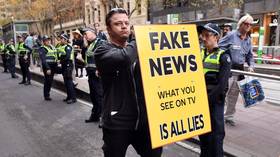‘Fake news’ a bigger threat than terrorism, poll finds – but what exactly is it?

A new poll has found that more Americans feel threatened by the creation and spread of fake news and misinformation than terrorism, violent crime, or illegal immigration. As for who creates the fake news, that’s up for debate.
Half of all Americans see made-up news as a bigger problem that other key security issues, a Pew Research Center poll published Tuesday has found. Though drug addiction and affordability of healthcare remain the biggest issues in the American consciousness, “made-up news and information” beat out violent crime, climate change, racism, illegal immigration and terrorism in the survey.
% of Americans who say ___ is a very big problem for the US today:Drug addiction 70%Affordable health care 67US political system 52Inequality 51Made-up news 50Violent crime 49Climate change 46Racism 40Illegal immigration 38Terrorism 34Sexism 26https://t.co/HqheK0Ah9spic.twitter.com/b58TUcv137
— Pew Research Center (@pewresearch) June 5, 2019
More than two thirds – 68 percent – say fake news shakes their confidence in government, 54 percent say it weakens their trust in each other, and 51 percent say it impacts political leaders’ ability to “get work done.”
Respondents blame political leaders and activists for much of the fake news circulating, but say the onus is on journalists to correct the problem. Nearly eight in ten believe that the spread of fake news should be restricted, with only 20 percent viewing it as protected under the First Amendment.
This data is all the more interesting given how vague the term “fake news” is. Though propaganda and disinformation is as old as the written word, the term took on a life of its own around 2016, when then-candidate Hillary Clinton used it to shut down conspiracy theories. Those included claims that her campaign manager John Podesta was secretly running an underage sex trafficking operation from the basement of a Washington DC pizza restaurant.
READ MORE: ‘Pizzagate’ gunman who opened fire in DC pizzeria sentenced to 4 years in prison
Buzzfeed Journalist Craig Silverman used the term “fake news” two years earlier to slam a conservative news site for publishing a false story about an ebola outbreak, and again when reporting on a Macedonian ‘troll farm’ he said was influencing the 2016 election. The connection with foreign interference still looms large, and 35 percent of the Pew poll’s respondents said they blame “foreign actors” for the supposed epidemic.
Fake news site National Report set off a measure of panic by publishing fake story about Ebola outbreak: https://t.co/CHrjtpUhyc Scumbags.
— Craig Silverman (@CraigSilverman) October 15, 2014
Throughout the 2016 election, the term became a byword for content of dubious origin shared on social media, favoring candidate Donald Trump. That all changed in January 2017, when President Trump began using the term to insult news outlets he saw as biased against him.
“I’m not going to give you a question,” he said to CNN’s Jim Acosta in his first press conference since election day. “You are fake news.”
Since then, Trump has tweeted the catchphrase a whopping 430 times.
If the totally Corrupt Media was less corrupt, I would be up by 15 points in the polls based on our tremendous success with the economy, maybe Best Ever! If the Corrupt Media was actually fair, I would be up by 25 points. Nevertheless, despite the Fake News, we’re doing great!
— Donald J. Trump (@realDonaldTrump) June 5, 2019
Still, the battle for ownership of the term rages on. Conservatives have lambasted the anti-Trump coverage of CNN, MSNBC, Buzzfeed et al. – including Rachel Maddow’s nightly ‘Russiagate’ meltdowns – as fake news, but liberals and Democrats have continued to accuse Trump of peddling fake news of his own, through boastful and hyperbolic tweets.
Also on rt.com Fake news takedown: Journalist shreds Rachel Maddow’s Russiagate conspiraciesRepublicans and right-leaning independents are more skeptical of the media, with 62 percent saying made up news is a big problem in America, compared to 40 percent of Democrats and left-leaning independents. Republicans are also three times as likely as Democrats to blame journalists for creating fake news (58 percent to 20 percent).
Despite the buzz around fake news, a majority of those surveyed feel the problem will get worse over time. Only one in ten believe the problem will go away.
Think your friends would be interested? Share this story!














